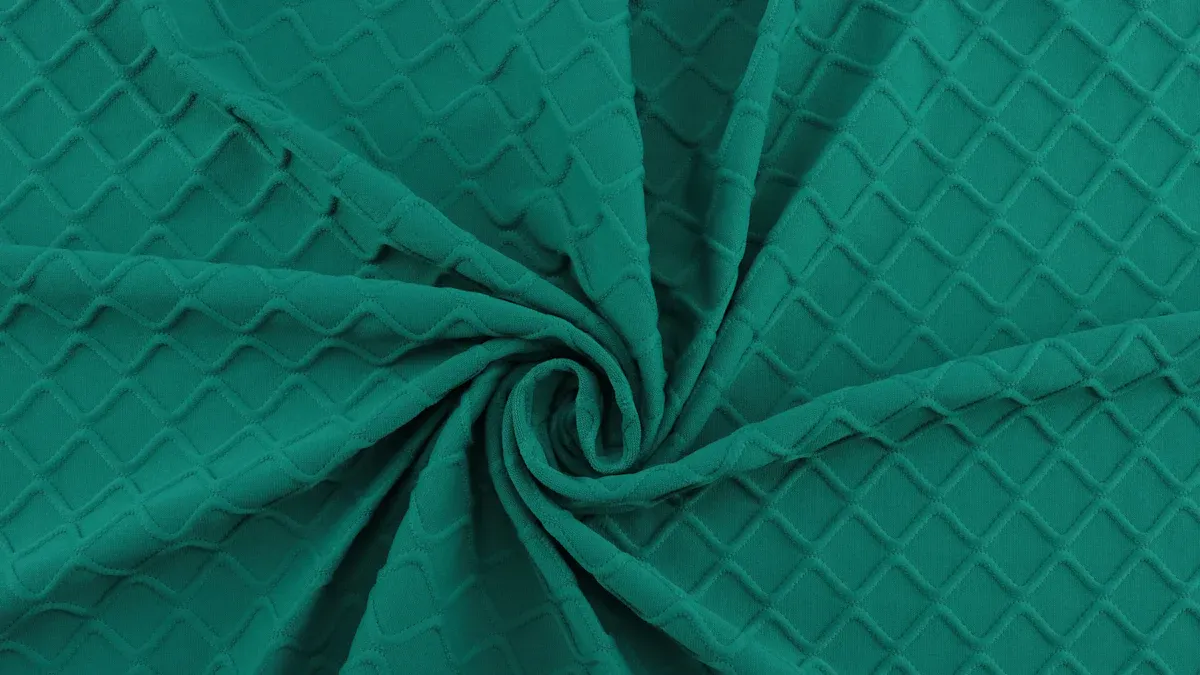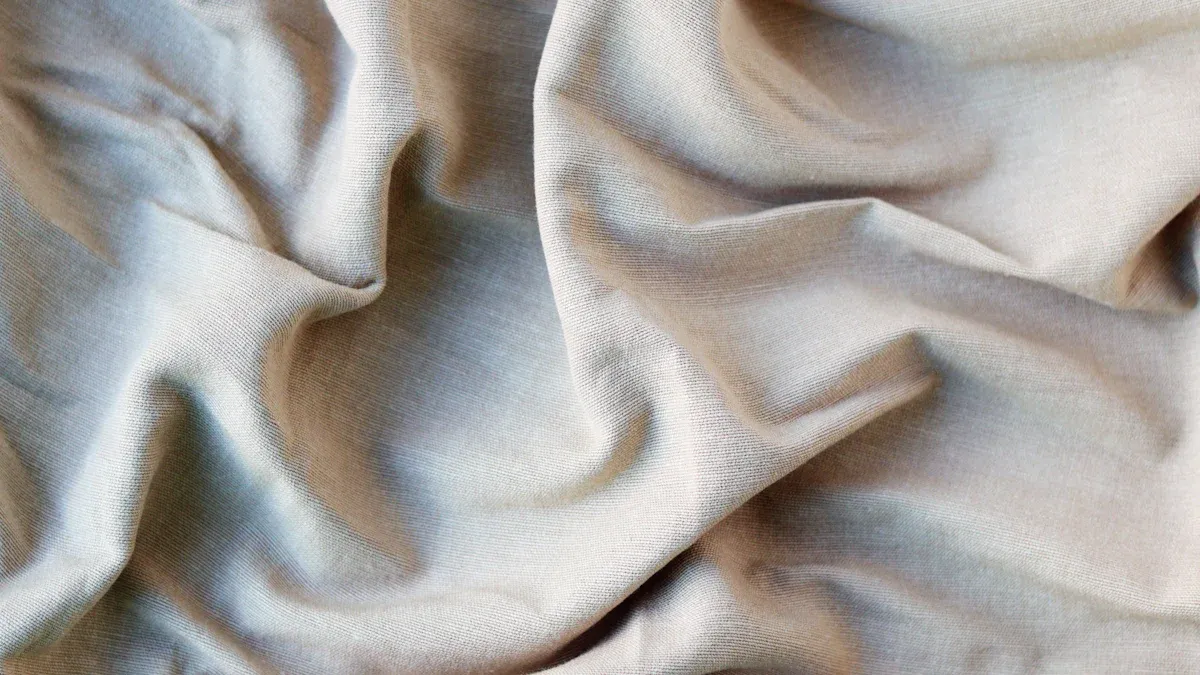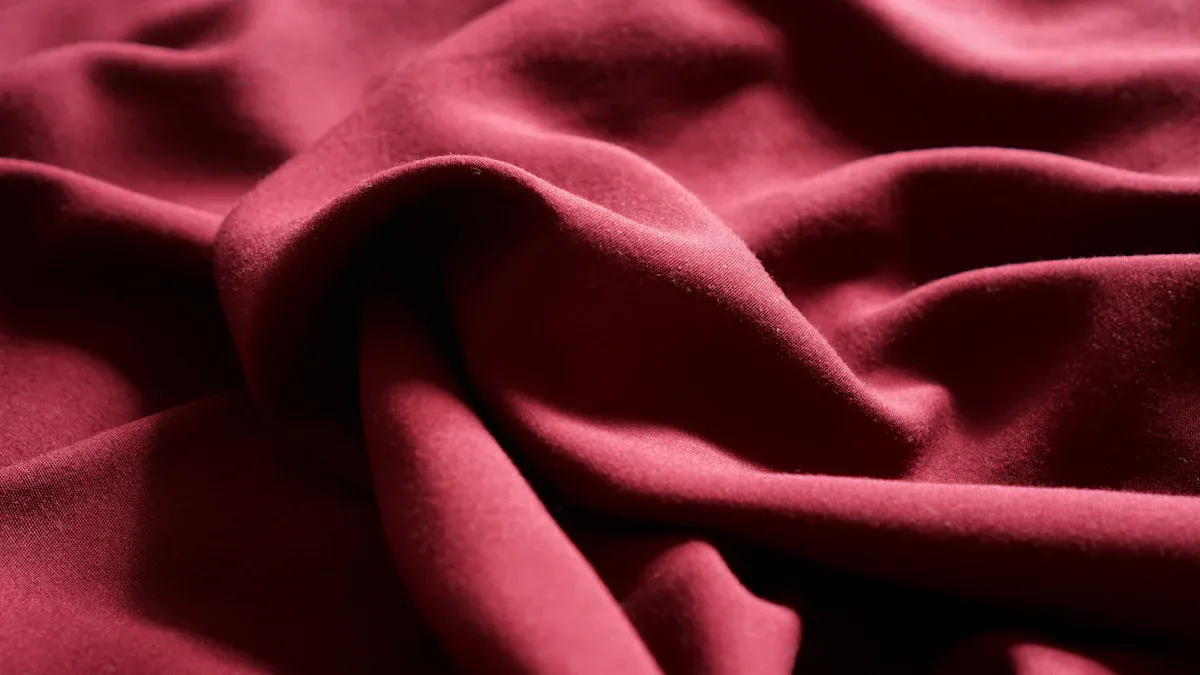
Jersey material offers a soft, stretchy knit fabric with a smooth surface. Manufacturers value its excellent stretch, breathability, and moisture absorption. Designers choose jersey material for its unique combination of comfort, style, and practicality. This fabric remains a favorite in modern apparel for its reliable performance and versatility.
Key Takeaways
- Jersey material feels soft and stretches easily, making it very comfortable for everyday wear and active use.
- This fabric breathes well and absorbs moisture, keeping you cool and dry during physical activities.
- Jersey is durable, easy to care for, affordable, and works well for many types of clothing and home textiles.
What Is Jersey Material?

Definition of Jersey Material
Jersey material refers to a type of knit fabric known for its smooth surface and soft texture. Manufacturers create this fabric using a single set of needles, which results in a fine, lightweight material. The fabric stretches easily across its width, making it ideal for garments that require flexibility and comfort. Designers often select jersey material for T-shirts, sportswear, and casual clothing because it drapes well and feels gentle against the skin. The fabric’s breathability and moisture absorption enhance its appeal for everyday wear.
How Jersey Material Is Made
The production of jersey material involves several precise steps. Each stage contributes to the fabric’s signature qualities:
- Farmers cultivate organic cotton using sustainable methods to ensure high-quality fibers.
- Workers harvest and gin the cotton to preserve fiber integrity.
- Technicians spin the fibers into yarn through carding, drawing, and roving processes.
- Circular knitting machines knit the yarn into jersey fabric, producing a smooth and stretchable material.
- Specialists finish the fabric by washing, dyeing with low-impact dyes, softening, and applying treatments that enhance durability and performance.
Note: The careful attention to each step in the manufacturing process ensures that jersey material maintains its softness, stretch, and versatility. This commitment to quality makes it a preferred choice in modern textiles.
Top 10 Reasons Jersey Material Stands Out

Softness of Jersey Material
Jersey material offers a unique softness that sets it apart from many other fabrics. The fine knit structure creates a smooth surface that feels gentle against the skin. Many people choose this fabric for clothing that sits close to the body, such as T-shirts and loungewear. The soft touch enhances comfort, making it a favorite for both adults and children.
Natural Stretch and Flexibility
The knit construction of jersey material provides excellent stretch and flexibility. This fabric stretches more across its width than its length, allowing for easy movement. Athletes and active individuals often prefer garments made from this material because it adapts to body movements. Designers value this flexibility when creating form-fitting or performance-oriented apparel.
Tip: Jersey material’s natural stretch means it rarely restricts movement, making it ideal for sportswear and everyday clothing.
Breathability and Comfort
Jersey material stands out for its breathability. The knit structure allows air to circulate, which helps regulate body temperature. This property keeps wearers cool in warm weather and comfortable during physical activity. The fabric also absorbs moisture, reducing the risk of irritation or discomfort.
Durability and Longevity
Manufacturers design jersey material to withstand frequent use and washing. The interlocking knit pattern resists wear and tear, maintaining its shape over time. Many garments made from this fabric retain their appearance and comfort even after repeated laundering. This durability makes it a practical choice for everyday wear.
Versatility in Applications
Jersey material finds use in a wide range of products. It appears in T-shirts, dresses, sportswear, underwear, and even home textiles. The fabric adapts well to different styles and functions, from casual to formal. Designers appreciate its ability to suit various needs and trends.
| Application Area | Example Products |
|---|---|
| Apparel | T-shirts, dresses |
| Sportswear | Activewear, leggings |
| Home Textiles | Bedsheets, pillowcases |
| Accessories | Scarves, hats |
Moisture-Wicking Abilities
Jersey material excels at drawing moisture away from the skin. The fibers absorb sweat and allow it to evaporate quickly. This property keeps wearers dry and comfortable, especially during exercise or hot weather. Many sports brands use this fabric for performance clothing due to its moisture management.
Easy Care and Maintenance
Caring for jersey material is simple. Most garments can be machine washed and dried without special treatment. The fabric resists wrinkles and rarely needs ironing. Busy individuals appreciate the low-maintenance nature of this material.
Note: Always check the care label for specific instructions, as blends may require different handling.
Affordability of Jersey Material
Jersey material offers an excellent balance between quality and cost. The production process is efficient, which helps keep prices reasonable. Consumers can find high-quality garments at accessible price points. This affordability makes it a popular choice for both manufacturers and shoppers.
Beautiful Drape and Fit
The fabric’s structure allows it to drape gracefully over the body. Jersey material creates garments that fit well without clinging uncomfortably. Designers use this property to craft clothing that flatters a variety of body types. The result is a polished look with maximum comfort.
Eco-Friendly Options
Many producers now offer eco-friendly jersey material made from organic cotton or recycled fibers. These options reduce environmental impact and support sustainable practices. Consumers seeking greener choices can find a range of products that align with their values.
Choosing eco-friendly jersey material supports both comfort and environmental responsibility.
Jersey material delivers unmatched softness, stretch, and breathability. Designers and consumers value its versatility in modern fabrics. Many choose this fabric for its comfort and practical benefits. Anyone seeking reliable textiles should consider jersey material for their next project or wardrobe addition.
FAQ
What types of clothing use jersey material most often?
T-shirts, dresses, sportswear, and underwear commonly feature jersey material. Designers select this fabric for its comfort, stretch, and versatility in both casual and activewear.
How should someone care for jersey fabric garments?
Most jersey garments require machine washing in cold water. Air drying helps maintain shape. Always check the care label for specific instructions.
Is jersey material suitable for sensitive skin?
Jersey material, especially when made from cotton, feels soft and gentle. Many people with sensitive skin prefer it for its smooth texture and breathability.
Post time: Aug-04-2025